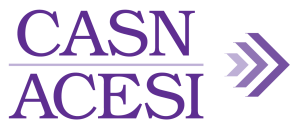home » Programs » Residency Program » About CASN
 CASN/ACESI (Canadian Association of Schools of Nursing/Association canadienne des écoles de sciences infirmières) is the national voice for nursing education, research, and scholarship and represents baccalaureate and graduate nursing programs in Canada.
CASN/ACESI (Canadian Association of Schools of Nursing/Association canadienne des écoles de sciences infirmières) is the national voice for nursing education, research, and scholarship and represents baccalaureate and graduate nursing programs in Canada.
CASN’s mission is to lead nursing education and nursing scholarship in the interest of healthier Canadians.
CASN/ACESI:
CASN/ACESI is . . .
CASN’s mission is, and has always been, to promote high-quality nursing education in Canada, and to advance nursing knowledge in the interest of healthier Canadians. That mission was the vision of the small band of university nurse educators who met for 3 days at the Windsor Hotel in Montreal in June of 1942 to “take counsel” with one another. They went home having formed the Provisional Council of University Schools and Departments of Nursing (PCUSDN), which would become the Canadian Association of Schools of Nursing, as we know it today.
In 1942, hospital training schools, using primarily an apprenticeship model of education, dominated the nursing education landscape. As a result, student nurses staffed the hospitals.
The first hospital training school in Canada was created by Dr. Mack in 1878. It led to an explosion of hospital training schools across the country. On graduating, nurses would receive a distinctive hospital pin at a fancy “pinning ceremony.”
This type of education followed a familiar pattern in all hospital schools: There was a 3-month probation followed by a capping ceremony. Then one became a Junior and next, an Intermediate, both identified by stripes on the uniform or cap. And finally, a Senior, which came with more responsibility as ward supervisors.
The landmark Flexner Report in 1910 led to major reforms in medical education, and universities became responsible for the education of physicians.
The Weir Report on nursing education in Canada, published in 1932, like the Flexner report, called for major reforms of nursing education, and it recommended university degrees replace hospital diplomas. But, unlike the Flexner Report, it had little impact.
At the time when the first council met in Montreal, a great deal of nursing education in Canada was heavy on service but light on academics. There were representatives from 11 universities at this founding meeting.
Educators from Laval and St. Francis Xavier also attended as special observers because their programs were directed by non-nurses.
Milestone 1 in CASN’s history was the creation of the Provisional Council.
The small band of members launched the organizations with the following set of objectives:
Milestone 2 was the creation of the CASN Accreditation Program. This began to take shape as early as 1952 when the Statutes and Regulations of the organization were adopted – their development was led by sister Denise Lefebvre de Marguerite d’Youville and Electa McLennan of Dalhousie. This identified the creation of standards for university schools of nursing in Canada as a key mandate of the organization.
In 1957, a precursor to the CASN Accreditation Program was published in a booklet titled Desirable Standards for Canadian Schools of Nursing – Normes souhaitables pour les écoles de sciences infirmières canadiennes.
The standards addressed:
The next step towards the CASN Accreditation Program was the creation of an accreditation committee in 1974. It consisted of:
The standards they developed were based on the principle that they would foster excellence without restricting individuality or innovation. This has remained a guiding principle of the CASN accreditation program. As this volunteer committee had no email, no video conferencing capability, and no staff to assist them, they came to Montreal when they could and met in Moyra Allen’s kitchen. The program was launched ten years later. And in 1987, l’Université de Montréal was the first school of nursing to receive CASN Accreditation.
Since 1987, the accreditation of nursing education programs in Canada has become a core function of CASN which reviews over a dozen schools every year. In 1994, CASN became a co-founder of the Association of Accrediting Agencies of Canada, a national association representing accrediting bodies of over 20 professions and other accrediting organizations. In recent years, in addition to the BScN CASN Accreditation has established 3 additional accreditation programs:
Milestone 3 was achieved when CASN members began to introduce PhD programs in nursing, preparing nurses to advance the discipline’s knowledge base through scholarship – one of the long-term goals of the founding members.
The pioneers were
Today, 21 of CASN members are offering PhD programs with an enrollment of 456 students across the country. 2 of CASN’s member schools are offering a doctorate in nursing (DN) as well as a PhD program for practice and government nursing leaders.
Milestone 4 was marked by the decision in 2002 of the CAUSN Council to become CASN – the Canadian Association of Schools of Nursing (CASN) – instead of the Canadian Association of University Schools of Nursing, and to adopt a new constitution. This represented a culmination of a big change in nursing education, a move to the baccalaureate as the entry-to-practice requirement for registered nurses. A key facilitator of this change in many jurisdictions was collaborative partnerships. College programs began to offer a baccalaureate program, in partnership with a university, rather than the diploma program.
The new CASN constitutions included the colleges engaged in baccalaureate education in its membership. This fourth milestone represents the attainment of a driving goal of the founding members – that nurses enter practice with a high-quality baccalaureate education. The 11 members schools who initially launched the organization have been joined by many others, which was one of their four specified objectives. Today, 95 CASN member schools are engaged in providing baccalaureate, and/or graduate programs of nursing across Canada.
Thanks to the vision and passion of the 11 founding schools of CASN, the association has grown to represent 95 schools, and continues to push forward the mandate they set – to advance nursing knowledge and nursing education in the interest of healthier Canadians in a variety of ways
There have been new directions within this original mandate as society and health care evolve, including:
For more information about CASN, visit https://www.casn.ca/
Dr. Cynthia Baker is the Executive Director of the Canadian Association of Schools of Nursing (CASN). She is a Professor Emerita of Queen’s University in Canada. She is the former Director of Queen’s University School of Nursing, and Associate Dean of the Health Science Faculty. Prior to this, she was the Director of l’École de science infirmière de l’Université de Moncton and worked in practice in mental health. CASN is the official national accrediting body of baccalaureate programs of nursing in Canada. Dr. Baker has had extensive experience with all components of accreditation and is an international accreditation consultant. Her educational qualifications include a bachelor’s degree from McGill University in Canada, an MPhil in anthropology from the University of London, England, a Master’s in Nursing degree from Dalhousie University in Canada, and a PhD from the University of Texas at Austin in the United States.
For information about CASN, contact us at inquire@casn.ca
Don Flaming is the Senior Nursing Education Coordinator at the Canadian Association of Schools of Nursing (CASN). As a nurse educator, he was a faculty member and program coordinator in the nursing program at Medicine Hat College in Alberta, Canada. During that time, he coordinated several approval and accreditation submissions to the provincial regulatory body and to CASN. He has also managed an ethics program for a provincial government agency and was the Manager, Nursing Education Program Approval and the Senior Manager, Policy and Practiceat the College and Association of Registered Nurses of Alberta, the provincial regulatory college for nursing. Before being employed by CASN, he sat on the CASN Accreditation Board and has also been a member of a provincial research ethics board., He has a Master’s and PhD in Nursing and has numerous publications and presentations, both peer reviewed and invited. In addition to his other responsibilities at CASN, Don is responsible for managing the CASN Residency Program.
For information about CASN’s Residency Program (English inquires), contact CASN’s Don Flaming dflaming@casn.ca
Jodie Lachance is the Nursing Residency Program Coordinator at the Canadian Association of Schools of Nursing (CASN). While at CASN, Jodie has worked in various programs such as in accreditation and education. Prior to this, Jodie was a nurse practitioner in primary care. She has a master’s degree in Nursing.
For information about CASN’s Residency Program (French inquires), contact CASN’s Jodie Lachance jlachance@casn.ca
We are honored to have been recognized for our efforts to advance the quality of Canadian nursing education. Here are some kind words from people that we appreciate:
“As Canada’s largest group of health professionals with more than 400,000 members, nurses are critical to Canada’s health care system. That is why, building on Budget 2023 investments and to further support nurses specifically, today, the Honourable Jean-Yves Duclos, Minister of Health, announced $2.4 million to the Canadian Association of Schools of Nursing (CASN) to support the implementation and evaluation of a National Nurse Residency Program.”

Minister Jean-Yves Duclos
Health Canada – News Release – April 20, 2023
“Improving our health care system includes addressing the challenges our nurses face across the country. This investment will help many nurses feel supported which will lead to better retention and recruitment. This in turn will help strengthen health care for all Canadians, as nurses play a crucial role in our daily wellbeing.”
The Honourable Jean-Yves Duclos – Minister of Health

CNO Leigh Chapman
“New nurses need adequate supports to be successful as they integrate into the practice environment. CASN’s residency program is essential in ensuring that new nurses are retained in the health workforce. Providing a robust residency program for new nurses will foster professional growth and nurture a culture of continuous learning for ongoing professional success.”
Dr. Leigh Chapman – Chief Nursing Officer of Canada
“CASN’s accreditation is recognized worldwide as an important objective method to review professional education programs.” “We all know that health care and the delivery of health care are always and forever changing. CASN recognizes this and wants to ensure that nursing education – and now NP education – programs are at the cutting edge of program delivery”
“The Canadian Association of Schools of Nursing highlights the opportunity to appreciate the courage and commitment that nurses, nurse educators, and nursing students display every day in the face of an increasingly complex and challenging health care profession”
“Nursing is one of the most popular programs we have at UNBC, and knowing that our program meets the rigorous requirements of CASN ensures our graduates will provide high quality care as registered nurses to the people of northern B.C.”
Daniel Weeks, (formerly) UNBC President
“The accreditation by CASN is another feather in the cap for the program.”…”It gives our students confidence and affirms for them that we meet not only provincial but national benchmarks, the highest standards,”
Yvonne Moritz, (formerly) Dean Science, Technology and Health for Okanagan College
The Canadian Association of Schools of Nursing respectfully acknowledges that its national office is located on the traditional unceded territory of the Algonquin People.
More information about CASN/ACESI is available by contacting our national office :
Canadian Association of Schools of Nursing
Association canadienne des écoles de sciences infirmières
200-1 Antares Drive
Ottawa ON K2E 8C4
Tel: (613) 235-3150 Fax: (613) 235-4476
E-mail: inquire@casn.ca
